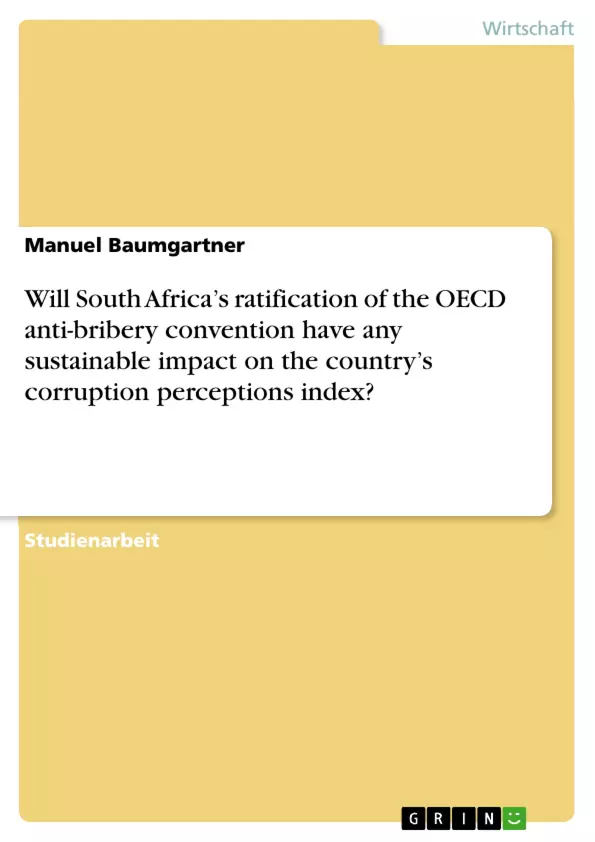Corruption has become a serious issue in today’s corporate and political environment. More and more countries tend to condone, yet appreciate the giving of gifts in order to accelerate the materialising of larger contracts. In many cases this is done without taking the public’s point of view into account.
This essay will investigate the question, if the ratification of the OECD Anti-Bribery Convention, which has been recently signed by South Africa as the 37th member, has had any major impacts on corruption in other member countries. Moreover, it will give an estimate about the development of South African corruption statistics in the near future.
In order to answer this question, chapter 2 will give a clear definition of the term corruption, as well as an explanation about why corruption happens worldwide and how it affects economic growth.
Adjacently, a brief introduction of the OECD Anti-Bribery Convention will be stated, which will be followed by an elaboration on the effects of the ratification of the Act on a number of member countries. According to the underlying data, a forecast of future development on South Africa’s corruption statistics will be given.
Inhaltsverzeichnis
- 1. INTRODUCTION
- 2. WHAT IS CORRUPTION?
- 2.1 WHAT ARE THE REASONS FOR THE FLOURISHING OF BRIBERY?
- 2.2 WHAT IMPACT DOES CORRUPTION HAVE ON ECONOMIC GROWTH?
- 2.2.1 WHAT ARE THE IMPACTS OF CORRUPTION EXPRESSED IN FIGURES?
- 2.2.2 WHO PAYS FOR CORRUPTION?
- 3. ORGANISATION FOR ECONOMIC CO-OPERATION AND DEVELOPMENT
- 3.1 WHAT IS SOUTH AFRICA'S CURRENT SITUATION REGARDING CORRUPTION?
- 3.2 WHAT ARE THE POPULATION'S EXPECTATIONS OF EFFECTS AFTER SIGNING THE CONVENTION?
- 4. SOUTH AFRICA AND THE ANTI-BRIBERY CONVENTION
- 4.1 HOW DID CPI STATISTICS FROM OECD CONVENTION MEMBER COUNTRIES CHANGE OVER THE PAST DECADE?
- 4.2 WHAT CAN SOUTH AFRICA EXPECT FROM THIS DEVELOPMENT?
- 5. SUMMARY:
Zielsetzung und Themenschwerpunkte
Diese Arbeit untersucht die Auswirkungen der Ratifizierung der OECD-Anti-Bestechungs-Konvention durch Südafrika auf die Korruption im Land. Die Untersuchung konzentriert sich auf die Frage, ob die Ratifizierung der Konvention, die Südafrika als 37. Mitglied unterzeichnet hat, zu einer nachhaltigen Verbesserung des Korruptionswahrnehmungsindex (CPI) führt. Die Arbeit beleuchtet die Definition von Korruption, die Ursachen für Bestechung, die Auswirkungen von Korruption auf das Wirtschaftswachstum und die Erwartungen der Bevölkerung in Bezug auf die Folgen der Unterzeichnung der Konvention.
- Korruption und ihre Ursachen
- Auswirkungen von Korruption auf das Wirtschaftswachstum
- Die OECD-Anti-Bestechungs-Konvention
- Die Situation Südafrikas in Bezug auf Korruption
- Erwartungen der Bevölkerung nach der Unterzeichnung der Konvention
Zusammenfassung der Kapitel
- Kapitel 1: Einführung Dieses Kapitel stellt das Thema der Arbeit vor und erklärt die Forschungsfrage. Es wird erläutert, warum Korruption ein ernstes Problem in der heutigen Wirtschafts- und politischen Umgebung ist.
- Kapitel 2: Was ist Korruption? Dieses Kapitel definiert den Begriff Korruption und erklärt die Ursachen für Bestechung weltweit. Es beleuchtet die Auswirkungen von Korruption auf das Wirtschaftswachstum und führt Statistiken auf, die die weitreichenden Folgen von Korruption verdeutlichen.
- Kapitel 3: Organisation für wirtschaftliche Zusammenarbeit und Entwicklung Dieses Kapitel gibt eine kurze Einführung in die OECD-Anti-Bestechungs-Konvention. Es beschreibt die aktuelle Situation Südafrikas in Bezug auf Korruption und untersucht die Erwartungen der Bevölkerung bezüglich der Auswirkungen der Ratifizierung der Konvention.
- Kapitel 4: Südafrika und die Anti-Bestechungs-Konvention Dieses Kapitel untersucht die Entwicklung der CPI-Statistiken von OECD-Konventionsmitgliedstaaten im letzten Jahrzehnt. Es analysiert die potenziellen Auswirkungen der Konvention auf Südafrika und prognostiziert die zukünftige Entwicklung der Korruptionsstatistiken des Landes.
Schlüsselwörter
Korruption, Bestechung, OECD-Anti-Bestechungs-Konvention, Südafrika, Korruptionswahrnehmungsindex (CPI), Wirtschaftswachstum, Entwicklung, Erwartungen, Auswirkungen, Statistiken.
Häufig gestellte Fragen
Was ist der Korruptionswahrnehmungsindex (CPI)?
Der CPI ist eine Statistik, die das Ausmaß der wahrgenommenen Korruption in verschiedenen Ländern misst und vergleicht.
Welchen Stellenwert hat die OECD-Anti-Bestechungs-Konvention für Südafrika?
Südafrika trat der Konvention als 37. Mitglied bei, um internationale Standards im Kampf gegen Korruption und Bestechung zu etablieren.
Welchen Einfluss hat Korruption auf das Wirtschaftswachstum?
Korruption hemmt das Wachstum, indem sie Ressourcen fehlleitet, den Wettbewerb verzerrt und das Vertrauen in politische und wirtschaftliche Institutionen untergräbt.
Was sind die Hauptursachen für Bestechung weltweit?
Die Arbeit untersucht verschiedene Gründe, darunter den Wunsch nach Beschleunigung von Verträgen und mangelnde Transparenz in Politik und Wirtschaft.
Welche Erwartungen hat die südafrikanische Bevölkerung an die Konvention?
Es besteht die Hoffnung auf eine nachhaltige Reduzierung der Korruption und eine Verbesserung der wirtschaftlichen Stabilität des Landes.
- Citation du texte
- Manuel Baumgartner (Auteur), 2007, Will South Africa’s ratification of the OECD anti-bribery convention have any sustainable impact on the country’s corruption perceptions index?, Munich, GRIN Verlag, https://www.grin.com/document/89058



